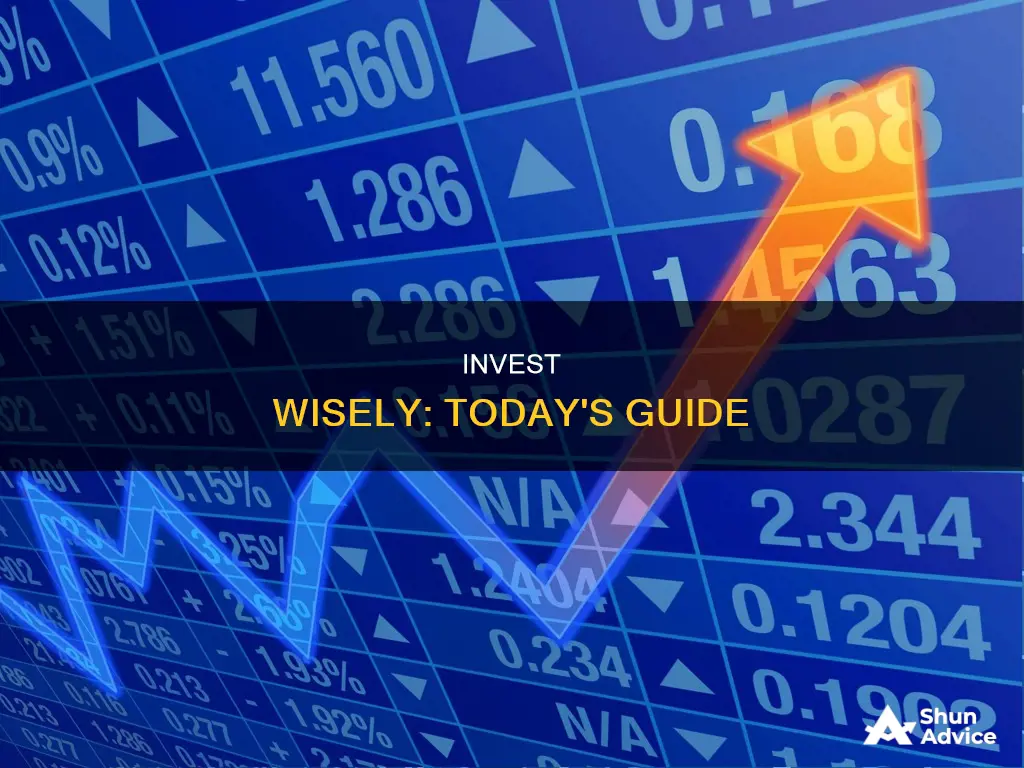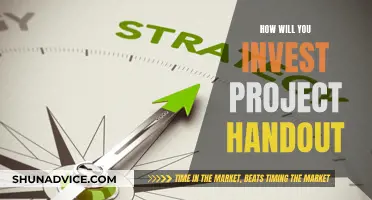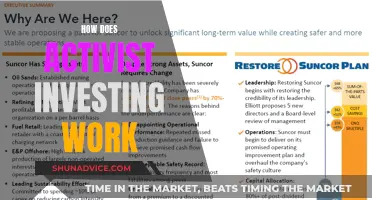
There are many ways to grow your money, from high-yield savings accounts to stocks. Here are some of the best investments to consider right now:
- High-yield savings accounts: Online savings accounts and cash management accounts offer higher rates of return than traditional bank accounts.
- Certificates of deposit (CDs): CDs are federally insured savings accounts that offer a fixed interest rate for a defined period.
- Bonds: Lower-risk government or corporate bonds tend to pay lower interest than higher-risk bonds. Government bonds are virtually risk-free but offer lower returns, while corporate bonds are riskier but can provide higher yields.
- Money market mutual funds: These funds invest in high-quality, short-term government, bank, or corporate debt and are suitable for money that may be needed soon but can be exposed to some market risk.
- Mutual funds: Mutual funds pool investor money to buy stocks, bonds, or other assets and are a convenient, inexpensive way to diversify your portfolio.
- Index funds: These funds aim to provide investment returns that match a specific market index, such as the S&P 500, and are more cost-effective and less volatile than actively managed funds.
- Exchange-traded funds (ETFs): ETFs are similar to mutual funds but trade on stock exchanges, allowing investors to buy and sell shares throughout the day.
- Stocks: Stocks offer the potential for higher returns but also come with higher levels of volatility. It's important to diversify your portfolio and limit individual stock holdings to 10% or less of your overall portfolio.
- Dividend stocks: Dividend stocks provide the fixed income of bonds and the growth potential of stocks. They are attractive to investors due to their regular cash payments and stability.
| Characteristics | Values |
|---|---|
| --- | --- |
| Savings accounts | High-yield savings accounts |
| CDs | Certificates of deposit |
| Bonds | Government or corporate bonds |
| Money market mutual funds | Money market funds |
| Mutual funds | Mutual funds |
| Index funds | Index funds |
| Exchange-traded funds | Exchange-traded funds |
| Stocks | Dividend stocks |
What You'll Learn

High-yield savings accounts
- My Banking Direct: 5.55% APY. My Banking Direct is an online-only division of Flagstar, a large regional bank. This account has no monthly fee and only requires $1 to earn the APY, but you will need at least $500 to open it.
- UFB Direct: 5.25% APY. UFB Direct is an online bank and a division of Axos Bank. It offers a competitive rate and has no minimum deposit requirement or monthly fees. However, there is a limit of $250,000 for the opening deposit and $30,000 for daily transfers.
- Credit Karma Money Save: 5.10% APY. Credit Karma is a financial technology company that offers a range of products, including a high-yield savings account. There is no minimum deposit requirement or monthly maintenance fee, and you only need a penny in your account to start earning the APY.
- Bread Savings: 5.15% APY. Bread Savings is another online-only savings account with no monthly fees. However, a minimum of $100 is required to open an account, and this must be deposited in a single transaction.
- Bask Bank: 5.10% APY. Bask Bank offers a competitive rate with no minimum balance requirement to open an account and no monthly fee.
When choosing a high-yield savings account, it is important to consider the APY, monthly fees, minimum deposit requirements, and other features such as ATM access and online banking. It is also crucial to remember that interest rates can change, so it is essential to monitor your account and be prepared to make changes if necessary.
Tesla: Invest or Avoid?
You may want to see also

Certificates of deposit (CDs)
CDs are a safer and more conservative investment than stocks and bonds, but they offer a lower opportunity for growth. They are also federally insured. When you open a CD with an FDIC- or NCUA-insured institution, up to $250,000 of your funds are protected if the institution fails.
CDs are a good idea if you have cash that you don't need now but will want within a few years. They are also a good option if you want a portion of your savings invested conservatively or if you want to avoid the risk and volatility of the stock and bond markets.
When opening a CD, you should consider the interest rate, term, principal, and financial institution. The interest rate is usually fixed, but there are variable-rate CDs that could earn a higher return if rates rise. The term is the length of time that you agree to leave your funds deposited to avoid any penalty. The principal is the amount that you agree to deposit when you open the CD. The financial institution will set factors such as early withdrawal penalties (EWPs) and whether your CD will default to being automatically reinvested at maturity.
CDs typically have higher rates than savings or money market accounts. However, tying up your money for long set terms may be safe, but you could miss out on higher interest returns if the federal funds rate increases. While you may be able to withdraw your money early, there will be penalties, some of which can cut into your principal.
Starbucks: A Brew Worth Betting On
You may want to see also

Bonds
There are several types of bonds:
- Corporate bonds are issued by companies to raise capital for initiatives like expansion and research and development. They are considered riskier than government bonds but usually offer higher yields.
- Municipal bonds are issued by a city, town or state to raise money for public projects such as schools, roads and hospitals. Municipal bonds are exempt from federal taxes and sometimes state and local taxes too.
- Treasury bonds are issued by the US government and are considered risk-free. They are backed by the "full faith and credit" of the US government.
- Zero-coupon bonds do not pay interest and are known as "deep discount" bonds. They are sold at a reduced price compared to their face value, and investors profit when the bond matures.
You can buy bonds in several ways:
- Directly from the issuer, including through the US Treasury's Treasury Direct service.
- Through a broker, including an online broker.
- As part of a mutual fund or ETF (exchange-traded fund).
- On the secondary market, which is accessible via brokers and banks.
When buying bonds, it's important to check the bond's rating, which indicates its financial health. The higher the rating, the greater the likelihood the issuer will honour its obligations.
There are several strategies for buying bonds:
- Bond ladder: buying bonds with staggered maturities to minimise reinvestment risk.
- Barbell strategy: buying short-term and long-term bonds but avoiding medium-term bonds.
- Bullet strategy: buying bonds that mature at roughly the same time.
- Steady income
- Diversification
- Lower risk
But they also have some disadvantages:
- Lower return
- Heavily exposed to interest rates and inflation
- Principal not guaranteed
Retirement Investments: Where Do Seniors Put Their Money?
You may want to see also

Money market mutual funds
There are several types of money market funds, including:
- Prime Money Funds: These funds invest in high-quality, short-term money market securities issued by U.S. and foreign entities, including corporations, financial institutions, and the U.S. government.
- Government and Treasury Money Funds: These funds invest in short-term U.S. government debt securities, such as Treasury bills, bonds, and notes, as well as repurchase agreements.
- Municipal Money Funds: These funds invest in short-term municipal money market securities issued by states, local governments, and other municipal agencies. The income generated by these funds is usually tax-exempt.
- Variable Share Price Money Funds: These funds are designed for institutional investors and invest in taxable short-term obligations issued by corporations and banks, as well as repurchase agreements and asset-backed commercial paper.
Money market funds are regulated by the U.S. Securities and Exchange Commission (SEC), which sets guidelines for the characteristics, maturity, and variety of allowable investments. The SEC also introduced rules in 2010 to improve stability and resilience in the wake of the 2008 financial crisis.
Money market funds are considered extremely low-risk and are suitable for investors who have a low tolerance for volatility or are looking for a more conservative investment option. While the returns may not be as high as other types of fixed-income funds, money market funds offer stability and liquidity. They are also easily accessible, with no transaction fees and a minimum investment as low as $0.
Doge Investors: Who and How Many?
You may want to see also

Mutual funds
Identify your goals and risk tolerance:
Before investing in any fund, you must identify your goals. Are you investing for long-term capital gains or do you want current income? Are you saving for retirement or your child's education? You should also consider your risk tolerance. Can you accept dramatic swings in portfolio value, or do you prefer a more conservative investment?
Decide on active or passive funds:
You can choose between actively managed funds, which aim to beat the market but often come with higher fees, or passively managed funds (index funds), which aim to duplicate the performance of a benchmark index and usually have lower fees.
Calculate your investing budget:
Consider how much money you can comfortably invest. Mutual funds usually have minimum investment amounts, which can range from $100 to $3,000, but some have no minimum. You also need to decide on the initial mix of funds that is right for you. If you are closer to retirement age, you may want more conservative investments, while younger investors can typically tolerate more risk.
Decide where to buy mutual funds:
You can buy mutual funds through a brokerage account, directly from the fund company (e.g. Vanguard or BlackRock), or with the help of a financial advisor. When choosing a brokerage, consider factors like affordability, fund choices, research and educational tools, and ease of use.
- Understand mutual fund fees:
- Pick the right mix of mutual funds:
It's important to diversify your investments to minimize risk. Consider spreading your investments across different types of mutual funds, such as growth and income, growth, aggressive growth, and international funds. Look for funds that have performed well over the long term (5-10 years or more) rather than just focusing on recent returns.
Manage your mutual fund portfolio:
Consider working with a financial advisor to help you choose the right mutual funds and stay engaged with your investment strategy. It's a good idea to check in with your advisor regularly to review the performance of your mutual funds and make any necessary adjustments.
Regression Analysis: Predicting Investment Returns
You may want to see also
Frequently asked questions
The best investments right now include high-yield savings accounts, certificates of deposit, bonds, money market mutual funds, mutual funds, index funds, exchange-traded funds, dividend stocks, and individual stocks.
The best stocks to buy and hold include PayPal, Shopify, MercadoLibre, CrowdStrike, Airbnb, Intuitive Surgical, Walt Disney, Berkshire Hathaway, Amazon, and Alphabet.
The best stocks to buy now or put on a watchlist include Meta Platforms, Goldman Sachs, Granite Construction, Universal Health Services, and Booking.
The best long-term investments to add to your portfolio include exchange-traded funds, alternative assets, dividend stocks, and real estate.
In the current environment, investors might consider an overweight allocation to equities and real assets (primarily commodities) and an underweight allocation to fixed income.







